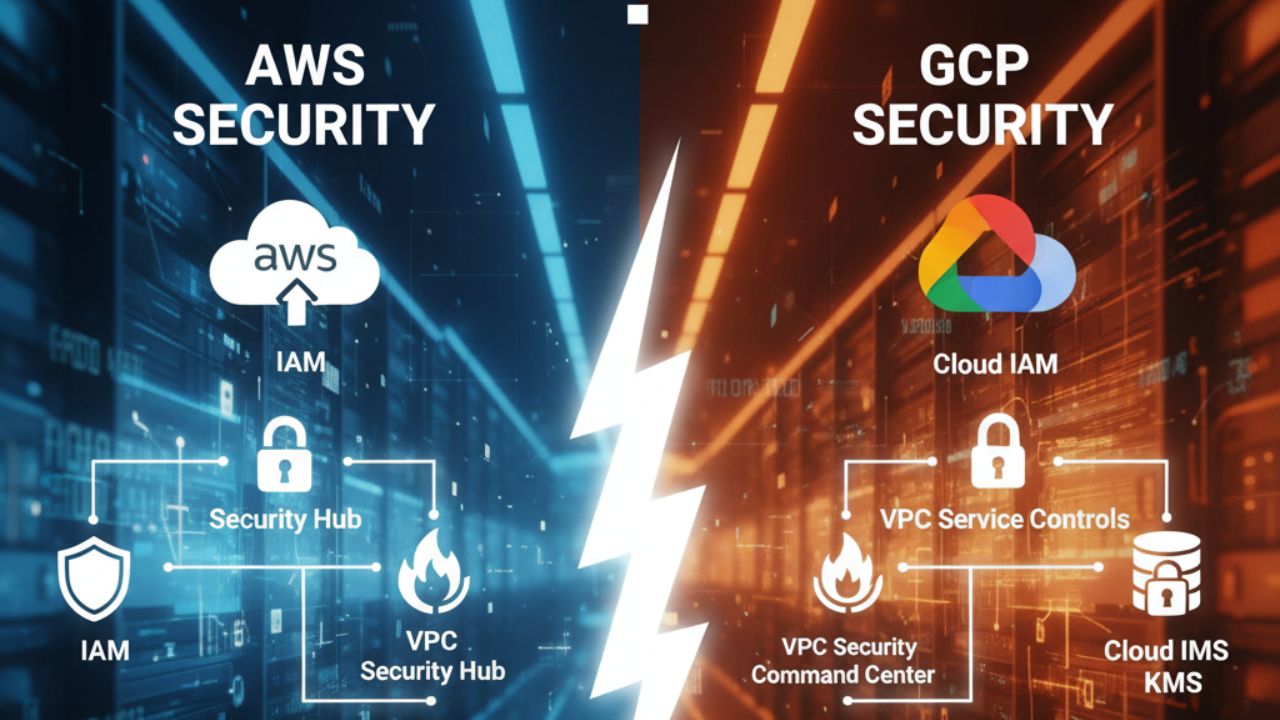
AWS and GCP both offer strong cloud security, but differ in focus. AWS provides detailed controls and compliance depth, while GCP simplifies security through automation and AI. AWS suits complex systems; GCP works best for fast-growing, data-heavy teams needing smart, global protection.
Cloud platforms run modern businesses, from startup apps to global systems. But security is the make-or-break factor. A single weak spot can lead to data leaks, downtime, or lost trust. Two leaders, Amazon Web Services (AWS) and Google Cloud Platform (GCP), take different paths to protect your setup. Both are strong, but their tools, focus, and style vary. If you’re choosing one or running both, knowing these differences helps you lock things down right. This article compares key security areas in plain terms like briefing a team new to cloud work.
The Shared Responsibility Model: Who Secures What?
Both AWS and GCP split duties. They secure the cloud the servers, cables, and buildings. You secure what’s in it: your apps, data, and settings.
This split is the same, but support differs. AWS gives deep, custom controls for complex needs. GCP builds in smart defaults to reduce mistakes. Think of AWS as a full toolkit you assemble. GCP hands you pre-built, reliable parts.
Identity and Access Management: Controlling Entry
Access control is your front door. Get it wrong, and intruders slip in.
AWS Identity and Access Management (IAM) is highly detailed. You define users, groups, and roles with exact permissions like allowing file reads but blocking deletes. It denies everything by default unless you allow it. Recent updates include tools to scan internal access to storage buckets in one view. Root accounts now require multi-factor authentication everywhere.
GCP Cloud IAM works top-down. Permissions flow from organization to projects, making large teams easier to manage. It also denies by default but adds smart checks like device health before login. A recent fix tightened container deployments, requiring clear read rights to prevent privilege jumps.
AWS fits messy, role-heavy setups. GCP simplifies policy for fast-growing teams.
Encryption and Data Protection: Locking Information
Data needs protection at rest and in motion.
AWS Key Management Service (KMS) lets you create and rotate keys for storage and databases. You choose your keys or use AWS ones. Storage buckets encrypt automatically by default. Recent changes allow exporting public certificates for mixed environments.
GCP encrypts everything automatically, no setup needed. It uses hardware security chips for strong roots. Key management ties into its global network for speed. A new unified security package bundles encryption with threat alerts using AI.
AWS wins for custom key needs, like in banking. GCP’s auto-setup cuts errors for quick builds.
Network Security: Building Digital Walls
Networks face constant attacks floods, probes, or hijacks.
AWS Virtual Private Cloud (VPC) isolates your resources. Security Groups act as instance-level firewalls. Network ACLs add rules per subnet. AWS Shield blocks DDoS attacks. New network posture tools now preview risks like open database ports. Web firewall adds auto-protection against app-layer floods.
GCP VPC spans the globe by default one network across regions. Cloud Armor handles DDoS and web attacks. Updates added rate limits by device fingerprint and network source for media apps. Firewalls apply from organization level down.
AWS VPC is regional and packed with options for strict control. GCP’s global design reduces setup for worldwide apps.
Threat Detection and Monitoring: Catching Problems Fast
You can’t stop what you don’t see. Both use AI to scan logs and flag issues.
AWS GuardDuty watches for odd behavior, like crypto mining or data exfiltration. New extended detection tracks multi-step attacks across containers and APIs. Security Hub gathers alerts and ranks active risks, cutting noise by over half in tests.
GCP Security Command Center scans assets for weak spots. It flags misconfigs, open buckets, or vulnerable code. AI-powered threat detection pulls from Google’s global intel, spotting phishing or malware early. Recent updates auto-classify sensitive data across storage.
AWS focuses on deep, service-specific scans. GCP leans on broad, AI-driven pattern matching.
Compliance and Auditing: Meeting Rules
Regulations like GDPR or RBI guidelines demand proof.
AWS offers over 100 compliance certifications. Artifact provides on-demand reports. Config tracks changes across resources. CloudTrail logs every action for audits.
GCP matches with strong compliance coverage. Access Transparency logs admin actions. Chronicle stores logs long-term with search. Audit logs integrate into BigQuery for custom reports.
AWS leads in niche industry certs. GCP simplifies log analysis for large datasets.
Automation and DevSecOps: Security in Code
Modern teams build with code. Security must follow.
AWS CodePipeline and Security Hub integrate scans into builds. GuardDuty APIs trigger auto-remediation. Infrastructure as Code tools like CloudFormation bake in policies.
GCP Cloud Build runs secure pipelines. Binary Authorization blocks unapproved containers. Security Health Analytics flags code risks in real time.
Both support DevSecOps, but GCP ties tighter to Google’s container focus. AWS spreads across more service types.
Cost and Management: Keeping It Practical
Security shouldn’t break the bank.
AWS charges per resource scans, logs, keys. Free tiers cover basics. Management is detailed but needs planning.
GCP includes core security in base pricing. Threat detection and encryption cost little extra. Dashboards are simpler to run.
AWS suits custom budgets. GCP feels lighter for startups.
Quick Comparison Table
| Area | AWS Strength | GCP Strength |
|---|---|---|
| Access Control | Granular roles, deny-by-default | Hierarchical, context-aware |
| Encryption | Custom keys, wide integration | Auto-encryption, hardware roots |
| Network | Regional VPC, deep firewalls | Global VPC, simple scaling |
| Threat Detection | Service-specific, auto-remediate | AI patterns, broad intel |
| Compliance | Most certifications | Easy log analysis |
| DevSecOps | Broad tool support | Tight container security |
Which Should You Choose?
Pick based on your setup:
- Choose AWS if you need fine control, many compliance checks, or complex hybrid systems.
- Choose GCP if you want simple defaults, global apps, or heavy AI and data use.
Many run both. Use AWS for regulated workloads, GCP for analytics or Kubernetes.
Final Words!
AWS and GCP both secure the cloud well but differently. AWS gives you control and depth. GCP offers simplicity and smart automation. Neither is better overall. The right one fits your team, apps, and risks.
Start with your biggest need access, data, or threats. Test both in a small project. Then scale what works. Security isn’t one-size-fits-all. Match the platform to your reality, and you stay protected without slowing down. Check out SecureMyORG for cybersecurity related services across world.


